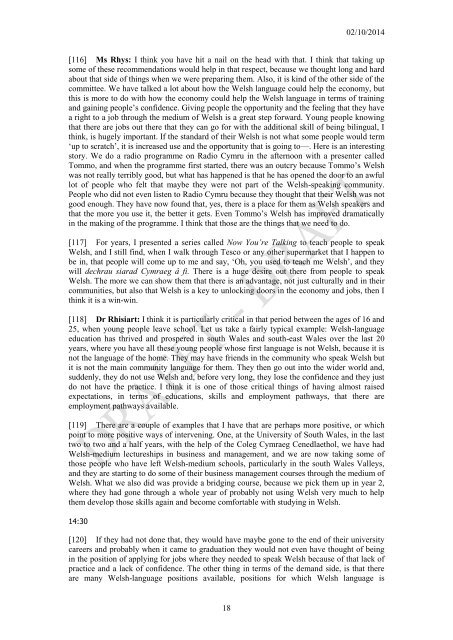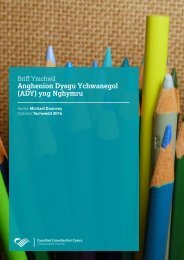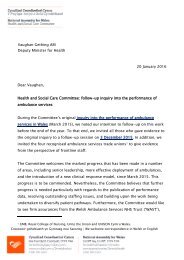You also want an ePaper? Increase the reach of your titles
YUMPU automatically turns print PDFs into web optimized ePapers that Google loves.
02/10/<strong>2014</strong><br />
[116] Ms Rhys: I think you have hit a nail on the head with that. I think that taking up<br />
some of these recommendations would help in that respect, because we thought long and hard<br />
about that side of things when we were preparing them. Also, it is kind of the other side of the<br />
committee. We have talked a lot about how the Welsh language could help the economy, but<br />
this is more to do with how the economy could help the Welsh language in terms of training<br />
and gaining people’s confidence. Giving people the opportunity and the feeling that they have<br />
a right to a job through the medium of Welsh is a great step forward. Young people knowing<br />
that there are jobs out there that they can go for with the additional skill of being bilingual, I<br />
think, is hugely important. If the standard of their Welsh is not what some people would term<br />
‘up to scratch’, it is increased use and the opportunity that is going to—. Here is an interesting<br />
story. We do a radio programme on Radio Cymru in the <strong>afternoon</strong> with a presenter called<br />
Tommo, and when the programme first started, there was an outcry because Tommo’s Welsh<br />
was not really terribly good, but what has happened is that he has opened the door to an awful<br />
lot of people who felt that maybe they were not part of the Welsh-speaking community.<br />
People who did not even listen to Radio Cymru because they thought that their Welsh was not<br />
good enough. They have now found that, yes, there is a place for them as Welsh speakers and<br />
that the more you use it, the better it gets. Even Tommo’s Welsh has improved dramatically<br />
in the making of the programme. I think that those are the things that we need to do.<br />
[117] For years, I presented a series called Now You’re Talking to teach people to speak<br />
Welsh, and I still find, when I walk through Tesco or any other supermarket that I happen to<br />
be in, that people will come up to me and say, ‘Oh, you used to teach me Welsh’, and they<br />
will dechrau siarad Cymraeg â fi. There is a huge desire out there from people to speak<br />
Welsh. The more we can show them that there is an advantage, not just culturally and in their<br />
communities, but also that Welsh is a key to unlocking doors in the economy and jobs, then I<br />
think it is a win-win.<br />
[118] Dr Rhisiart: I think it is particularly critical in that period between the ages of 16 and<br />
25, when young people leave school. Let us take a fairly typical example: Welsh-language<br />
education has thrived and prospered in south Wales and south-east Wales over the last 20<br />
years, where you have all these young people whose first language is not Welsh, because it is<br />
not the language of the home. They may have friends in the community who speak Welsh but<br />
it is not the main community language for them. They then go out into the wider world and,<br />
suddenly, they do not use Welsh and, before very long, they lose the confidence and they just<br />
do not have the practice. I think it is one of those critical things of having almost raised<br />
expectations, in terms of educations, skills and employment pathways, that there are<br />
employment pathways available.<br />
[119] There are a couple of examples that I have that are perhaps more positive, or which<br />
point to more positive ways of intervening. One, at the University of South Wales, in the last<br />
two to two and a half years, with the help of the Coleg Cymraeg Cenedlaethol, we have had<br />
Welsh-medium lectureships in business and management, and we are now taking some of<br />
those people who have left Welsh-medium schools, particularly in the south Wales Valleys,<br />
and they are starting to do some of their business management courses through the medium of<br />
Welsh. What we also did was provide a bridging course, because we pick them up in year 2,<br />
where they had gone through a whole year of probably not using Welsh very much to help<br />
them develop those skills again and become comfortable with studying in Welsh.<br />
14:30<br />
[120] If they had not done that, they would have maybe gone to the end of their university<br />
careers and probably when it came to graduation they would not even have thought of being<br />
in the position of applying for jobs where they needed to speak Welsh because of that lack of<br />
practice and a lack of confidence. The other thing in terms of the demand side, is that there<br />
are many Welsh-language positions available, positions for which Welsh language is<br />
18








